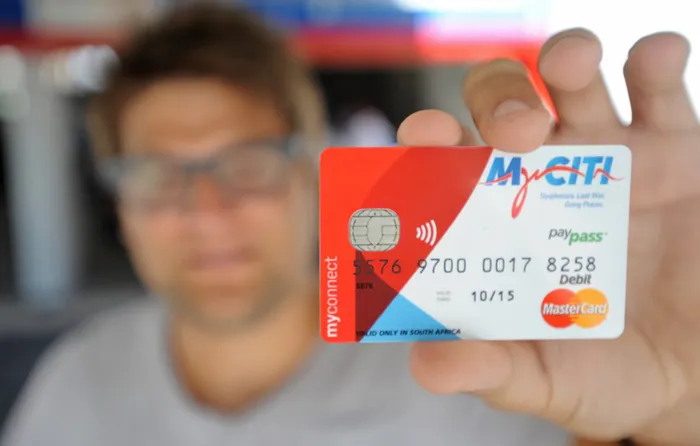MyCiTi takes flak for new bank card system

Cape Town - 120109 - myconnect cards are on sale at the Civic Centre station. Pictured is Ashley Gibson with his newly purchased myconnect card. Picture: David Ritchie Cape Town - 120109 - myconnect cards are on sale at the Civic Centre station. Pictured is Ashley Gibson with his newly purchased myconnect card. Picture: David Ritchie
Babalo Ndenze
Metro Writer
THE City of Cape Town and “big four” bank Absa have been accused of extortion by a MyCiTi bus user over the decision to charge commuters every time they load money on the new myconnect card.
The cards are available for purchase at all MyCiTi station ticket kiosks and will replace the paper ticket system later this month.
The myconnect card is a bank card issued by Absa, which clinched a six-year contract with the city valued at R413 million. As with other banking products, there is a fee to load value on the myconnect card, according to the city – a decision that has angered Table View resident Mike Clery.
In an open letter to mayoral committee member for transport, roads and stormwater Brett Herron, Clery said the system “being forced on MyCiTi users without any prior public consultation is unacceptable”.
In October the MyCiTi service reached one million passengers, ferried a record 12 500 passengers in one day and reached 100 000 passengers on the airport shuttle service.
“A small deposit, no more than replacement cost of the card, is reasonable. But charging commuters every time they load money on to the card is extortion. Please don’t excuse this by claiming that there will be other value-added services in future – in an age where almost everyone already uses a banking service, we don’t want another one,” wrote Clery.
He said the system appeared to be a “rushed, half-baked effort … and it’s particularly galling that one of the big banks will be the beneficiary. I’m sure that I’m not alone in wanting to know just how this service, and service provider, was selected,” Clery said.
Responding to Clery, Herron said no portion of the 2.5 percent charges was paid to the city, only to Absa.
“These funds cover Absa’s cost of providing the service and back office systems to the city. Absa won the tender, as a subcontractor of the main contractor, ICT Works (Pty) Ltd, to be the service provider for this card fare system.”
The bank fee is 2.5 percent of the value loaded or a minimum of R1.50 per transaction. If a commuter loads R200, R5 will be deducted to cover the bank charge, leaving the card holder with R195 to spend.
Herron said an electronic payment system for public transport, which is intended to facilitate seamless travel across various modes of transport operated by different public transport providers, requires “sophisticated, flexible and complex systems”.
“The cost of developing a payment system which does not rest on the existing South African banking system would have been enormous. Had the city implemented this card system on its own, without the benefit of a bank backing the system, the costs passed on to the passengers would have been significantly higher than the current 2.5 percent admin fee or minimum fee of R1.50. So indirectly, the bank charge does go back into the service.”
He said providing the myconnect card via the bank saved the customer money. “This is one of the reasons why the use of this card is prescribed by the national Department of Transport for all electronic fare systems implemented from June 2011.”
Paper tickets will be sold until January 20 and can be used until January 27.
babalo.ndenze@inl.co.za